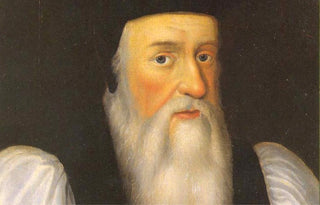To appreciate Thomas Cranmer we need to understand his world. He was born in Nottinghamshire in 1489 at a time when almost all Europe followed a single religion: a Catholic Christianity controlled by the Pope with Latin as its language of worship. It was a faith in which a genuine trust in Christ was mixed with unhelpful rituals and rules. The church also wielded enormous political power which meant that it controlled almost every aspect of life. Yet beginning with Martin Luther’s protest in 1517, the Reformation saw the thousand-year-old dominance of the mediaeval church shaken, with consequences that have shaped Europe to this day. The way in which the reformation affected Britain is largely due to one man: Thomas Cranmer.
Growing up in obscurity, Cranmer was educated at Cambridge University where he seemed destined for an academic career. He was ordained in 1520 and was an ordinary ‘medieval churchman’.
King Henry VIII was demanding that his first marriage should be annulled and Cranmer found himself appointed ambassador to the Holy Roman Emperor to advance the process. Travelling through Europe, Cranmer encountered Lutheran theologians and became sympathetic to what we can call ‘evangelical theology’. The fact that he got married in 1532 is convincing proof that by then he’d rejected the idea that priests were to be celibate!
Cranmer’s life was overturned when the king chose him to be Archbishop of Canterbury. Soon it was clear that the new archbishop – now openly an evangelical – wanted the church to be under the authority of Scripture. Cranmer was anxious to bring in what the Bible taught and reject those things for which he found no biblical authority.
With the help of Thomas Cromwell, the king’s powerful chief minister, Cranmer founded a ‘Church of England’ with the monarch, not the Pope, as its head; an arrangement that suited Henry VIII very well. Knowing that this English church required both a Bible and rules for services in English, Cranmer set about having them created.
With the church entwined in politics and Henry VIII increasingly unstable and violent, the task of reform was both hard and perilous. Nevertheless, unlike thousands of people, including Cromwell, Cranmer avoided execution. Something which reveals both Cranmer’s faith and his relationship with Henry is the story of how, when the king was dying, he summoned the archbishop to his bedside. There, instead of offering the king the Last Rites, Cranmer simply knelt by him and, holding his hand, encouraged the king to ‘put his trust in Christ’.
Henry’s successor, the boy king Edward VI, gave Cranmer his full support during his brief reign and increasingly ‘the old religion’ disappeared as the archbishop moved to publish and circulate both an English Bible and a manual for church services: The Book Of Common Prayer.
Edward died in 1553 and Mary, seizing power, immediately tried to reverse Cranmer’s achievements. Cranmer found himself charged with treason and heresy. Imprisoned for over two years, he was forced to watch the execution of two colleagues, Ridley and Latimer. Queen Mary decided to wreck the evangelical cause by having Cranmer publicly recant before being burnt as a heretic. So, in March 1556 Cranmer was allowed to speak from the pulpit of St Mary’s Oxford to a large crowd. He began reading the prepared statement but midway through, Cranmer departed from his script, withdrew his recantations and instead defiantly proclaimed his evangelical beliefs. As he was dragged to the stake, Cranmer reminded everybody that it was his right hand that had signed his confessions and, as the flames rose, thrust it into the fire. His last words were: ‘Lord Jesus, receive my spirit. I see the heavens open and Jesus standing at the right hand of God.’ In his last hour Cranmer turned a bitter defeat into a triumph.
Thomas Cranmer lived in a difficult time and was often forced to make hard and sometimes questionable decisions. Nevertheless, he remains a hero; let me share three things that I admire about him.
First, I admire Cranmer’s ambition. I believe that Cranmer’s overriding desire was to simply bring men and women before God. He wanted a Bible in English so ordinary people could hear God speak, and he wanted a prayer book in English so that people could speak with God. Almost all the things he fought against – rituals and rules – he opposed because he saw them as barriers between human beings and God. Here, he was not just an evangelical, but an evangelist.
I admire Cranmer’s approach. Faith and works came together in Cranmer. He was a man of prayer and study; gracious, tolerant and incorruptible. He was a wise strategist: knowing when to speak and when to be silent, building alliances and making friends of enemies. He was patient, playing the ‘long game’ to achieve his goals. He added to these skills and talents the indispensable gift of courage. So when Queen Mary seized power and the stake loomed, Cranmer didn’t flee abroad. He stayed at his post.
I admire Cranmer’s achievements. As an organiser, Cranmer gave the national church a framework that has enabled it to steer a steady course over the centuries. As a writer, he gave the world the remarkable Book of Common Prayer,where everything, whether borrowed or original, is crafted in noble, accessible and memorable prose that is still endlessly quoted. Not only did Cranmer give the English nation a church, he helped create its language.
Let’s join in with Cranmer’s prayer and pray:
BLESSED Lord, who hast caused all holy Scriptures to be written for our learning: Grant that we may in such wise hear them, read, mark, learn, and inwardly digest them, that by patience and comfort of thy holy Word, we may embrace and ever hold fast the blessed hope of everlasting life, which thou hast given us in our Saviour Jesus Christ. Amen.
J.John
Reverend Canon




